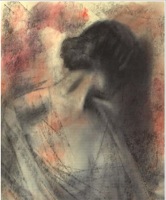Difference between revisions of "Melancholia"
m (Text replacement - "http://" to "https://") |
|||
| (2 intermediate revisions by 2 users not shown) | |||
| Line 1: | Line 1: | ||
[[File:lighterstill.jpg]][[File:Melancholy_cliff_warner.jpg|right|frame]] | [[File:lighterstill.jpg]][[File:Melancholy_cliff_warner.jpg|right|frame]] | ||
| − | [[Melancholia]] (from Greek μελαγχολία - melancholia "sadness, lit. black bile"), also lugubriousness, from the [[Latin]] lugere, to mourn; moroseness, from the Latin morosus, self-willed, fastidious habit; wistfulness, from old [[English]] wist: [[intent]], or saturnine, (see Saturn), in contemporary usage, is a [[mood]] disorder of non-specific | + | [[Melancholia]] (from Greek μελαγχολία - melancholia "sadness, lit. black bile"), also lugubriousness, from the [[Latin]] lugere, to mourn; moroseness, from the Latin morosus, self-willed, fastidious habit; wistfulness, from old [[English]] wist: [[intent]], or saturnine, (see Saturn), in contemporary usage, is a [[mood]] disorder of non-specific depression, characterized by low levels of [[enthusiasm]] and eagerness for activity. |
In a modern [[context]], "melancholy" applies only to the mental or emotional symptoms of depression or despondency; historically, "melancholia" could be [[physical]] as well as [[mental]], and melancholic conditions were classified as such by their common cause rather than by their properties.[1] | In a modern [[context]], "melancholy" applies only to the mental or emotional symptoms of depression or despondency; historically, "melancholia" could be [[physical]] as well as [[mental]], and melancholic conditions were classified as such by their common cause rather than by their properties.[1] | ||
| − | <center>For lessons on '''''Depression''''', follow [ | + | <center>For lessons on '''''Depression''''', follow [https://nordan.daynal.org/wiki/index.php?title=Category:Depression this link].</center> |
| − | Similarly, melancholia in ancient usage also encompassed mental disorders which might now be classed as [[schizophrenia]]s or [[bipolar disorders]].[ | + | Similarly, melancholia in ancient usage also encompassed mental disorders which might now be classed as [[schizophrenia]]s or [[bipolar disorders]].[https://en.wikipedia.org/wiki/Melancholia] |
==Notes== | ==Notes== | ||
# G E Berrios (1988) Melancholia and depression during the 19th century. A conceptual History. British Journal of Psychiatry 153: 298-304 | # G E Berrios (1988) Melancholia and depression during the 19th century. A conceptual History. British Journal of Psychiatry 153: 298-304 | ||
| Line 11: | Line 11: | ||
# Hanafy A. Youssef, Fatma A. Youssef and T. R. Dening (1996), "Evidence for the existence of schizophrenia in medieval Islamic society", History of Psychiatry 7: 55-62 [56]. | # Hanafy A. Youssef, Fatma A. Youssef and T. R. Dening (1996), "Evidence for the existence of schizophrenia in medieval Islamic society", History of Psychiatry 7: 55-62 [56]. | ||
==External Links== | ==External Links== | ||
| − | *[ | + | *[https://www2.hammer.ucla.edu/etc/durer/ Grunwald Center website: Durer's ''Melencolia'' and clinical depression, iconography and printmaking techniques] |
| − | *[ | + | *[https://www.theotherpages.org/poems/2000/d/dowden53.html "Dürer's Melancholia": sonnet by Edward Dowden] |
| − | *[ | + | *[https://www.signandsight.com/features/710.html ''Melancholy and abstraction''], on the Berlin exhibition "Melancholy: Genius and Madness in Art" |
| − | *[ | + | *[https://hdl.handle.net/2027/spo.did2222.0000.808 Diderot's historic writing on Melancholy - translated into English by Matthew Chozick] |
[[Category: Psychology]] | [[Category: Psychology]] | ||
Latest revision as of 01:24, 13 December 2020
Melancholia (from Greek μελαγχολία - melancholia "sadness, lit. black bile"), also lugubriousness, from the Latin lugere, to mourn; moroseness, from the Latin morosus, self-willed, fastidious habit; wistfulness, from old English wist: intent, or saturnine, (see Saturn), in contemporary usage, is a mood disorder of non-specific depression, characterized by low levels of enthusiasm and eagerness for activity.
In a modern context, "melancholy" applies only to the mental or emotional symptoms of depression or despondency; historically, "melancholia" could be physical as well as mental, and melancholic conditions were classified as such by their common cause rather than by their properties.[1]
Similarly, melancholia in ancient usage also encompassed mental disorders which might now be classed as schizophrenias or bipolar disorders.[1]
Notes
- G E Berrios (1988) Melancholia and depression during the 19th century. A conceptual History. British Journal of Psychiatry 153: 298-304
- Hippocrates, Aphorisms, Section 6.23
- Hanafy A. Youssef, Fatma A. Youssef and T. R. Dening (1996), "Evidence for the existence of schizophrenia in medieval Islamic society", History of Psychiatry 7: 55-62 [56].
External Links
- Grunwald Center website: Durer's Melencolia and clinical depression, iconography and printmaking techniques
- "Dürer's Melancholia": sonnet by Edward Dowden
- Melancholy and abstraction, on the Berlin exhibition "Melancholy: Genius and Madness in Art"
- Diderot's historic writing on Melancholy - translated into English by Matthew Chozick
